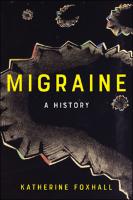Migraine
A History
Author(s)
Foxhall, Katherine
Collection
WellcomeLanguage
EnglishAbstract
For centuries, people have talked of a powerful bodily disorder called migraine, which currently affects about a billion people around the world. Yet until now, the rich history of this condition has barely been told. In Migraine, award-winning historian Katherine Foxhall reveals the ideas and methods that ordinary people and medical professionals have used to describe, explain, and treat migraine since the Middle Ages. Touching on classical theories of humoral disturbance and medieval bloodletting, Foxhall also describes early modern herbal remedies, the emergence of neurology, and evolving practices of therapeutic experimentation. Throughout the book, Foxhall persuasively argues that our current knowledge of migraine's neurobiology is founded on a centuries-long social, cultural, and medical history. This history, she demonstrates, continues to profoundly shape our knowledge of this complicated disease, our attitudes toward people who have migraine, and the sometimes drastic measures that we take to address pain. Migraine is an intimate look at how cultural attitudes and therapeutic practices have changed radically in response to medical and pharmaceutical developments. Foxhall draws on a wealth of previously unexamined sources, including medieval manuscripts, early-modern recipe books, professional medical journals, hospital case notes, newspaper advertisements, private diaries, consultation letters, artworks, poetry, and YouTube videos. Deeply researched and beautifully written, this fascinating and accessible study of one of our most common, disabling—and yet often dismissed—disorders will appeal to physicians, historians, scholars in medical humanities, and people living with migraine alike.
Keywords
migraine; medical historyISBN
9781421429489, 9781421429496, 9781421429502Publisher
Johns Hopkins University PressPublication date and place
Baltimore, 2019Grantor
Classification
Human biology


 Download
Download